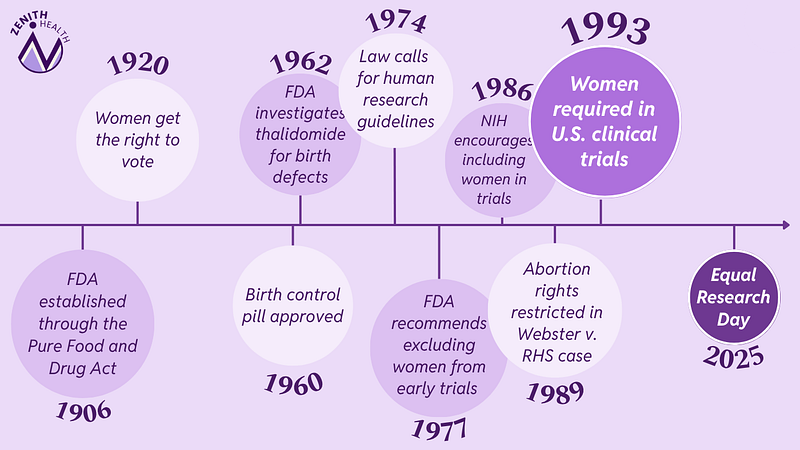
Today (June 10) is Equal Research Day: celebrated to raise awareness of the gender health gap and to promote inclusive research. June 10, 1993 is when women were finally required to be included in clinical research in the U.S.
Before then, the vast majority of research that shaped modern medicine happened without consideration of how women’s bodies and health may be distinct from that of men, and there are countless gaps in our scientific and medical understanding of the female body that persist to this day.
Putting this in perspective…here are a few things that have been around for longer than women in clinical research:
- Waffle House (1955)
- Launch of the Human Genome Project (1990)
- Seinfeld (1989)
- Anyone over the age of 32
- Nike shoes (1972)
- Home Alone (1 AND 2!) (1990, 1992)
- Whole Foods Market (1980)
- …and SO many more things that we all know and take for granted today.
Our hope is that in elevating Equal Research Day, the critical gaps in women’s health research are seen and felt beyond just women, and beyond just those working in healthcare or research. To make a dent in bringing us up to par with the rest of medical and scientific research, investment, advocacy, engagement, and participation is needed from across the ecosystem.
These gaps aren’t just academic — they have real consequences on care and health outcomes for women. Especially when you consider that women’s health is not just limited to sex-based conditions, affecting only females (e.g. menopause, endometriosis, or pregnancy) — but also includes health conditions that affect women differently (in different ways, with different symptoms, experience or presentation) or disproportionally (at higher frequency or more commonly — for example, autoimmune disorders).
Massive amounts of progress are needed across the spectrum, but the data and research gaps are particularly pronounced in pregnancy. Pregnancy remains one of the most under-researched areas of healthcare, and care lags as a result. A few examples:
- Lack of drug safety data: while more than 90% of pregnant women take at least one medication, fewer than 10% of drugs approved since 1980 have enough data to determine safety in pregnancy (meanwhile, there are three approved treatments for male pattern baldness, a.k.a a receding hairline)
- Preventable deaths: More than 80% of pregnancy related deaths are preventable
- Minimal funding: federal funding for pregnancy research (and specifically maternal health, as compared to that focused on neonatal health) is limited and fragmented, and only 1% of pharma R&D projects concern maternal health
So why is pregnancy research so far behind even the rest of women’s health?
Traditional clinical trials aren’t typically an appropriate option for pregnancy, which is how much medical research is done today. It’s not ethical to ask someone who’s pregnant to try a drug or experimental treatment regimen, and many pregnancy research questions are poorly suited to a trial design.
However, just because the traditional clinical trial paradigm isn’t well-suited to study pregnancy, there are other ways to generate the critical knowledge and understanding we need!
One of the most powerful tools we have is observational research, which tracks what real people choose to do in real life, and analyzes the outcomes. It doesn’t require individuals making any changes to their care or testing out experimental treatments — it just requires good data at scale, and the right approach to do something impactful with it. Observational research is the approach we’re taking at Zenith to build the Pregnancy Evidence Project, to leverage real-world data for improved maternal health outcomes.
Are you as inspired as we are by #EqualResearchDay and bringing women’s health research up to speed with the rest of medical research? Here are a few ways to get involved today:
- Spread awareness with your friends, family and networks for #EqualResearchDay by sharing across social media
- Get directly involved in research — consider checking out the Pregnancy Evidence Project
- Explore the existing evidence — we’re donating $1 for each new sign up though the end of June to the March of Dimes, an incredible nonprofit organization working to end preventable maternal health risks and deaths, and to close the health equity gap
*****
At Zenith, we honor Equal Research Day every day — with our vision to close the pregnancy research gap by making it easier to both access and contribute to the data that’s so urgently needed — and that’s why we’re building out our own observational research registry, the Pregnancy Evidence Project. The Pregnancy Evidence Project is designed to be the most ambitious and broadest-scale pregnancy health research effort in the country, powered by opt-in participation from pregnant people eager to close the research gap. Learn more about Zenith here.